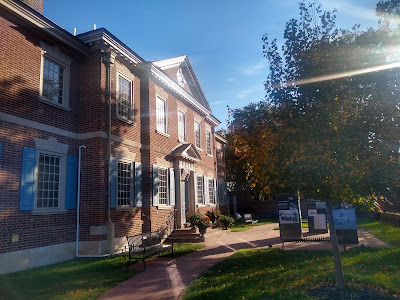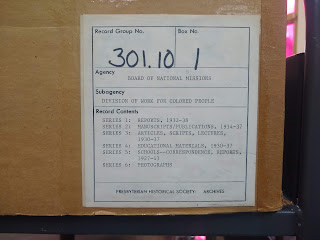What do you do when you find out that the records of a Georgia school that several of your maternal cousins attended are actually located in a building just a few minutes from where you go to work every day in Philadelphia?
Yep – you decide that a vacation day is warranted as soon as can be arranged and immediately schedule a research appointment! And that’s how I ended up at the Presbyterian Historical Society on Halloween, laptop, notebook and pencil in hand, to explore the records of Boggs Academy.
 |
| Settling in with my first batch of materials. |
Now, Boggs Academy is a school that’s in the relatively recent past for my family. Four of my first cousins twice removed (my grandmother Elnora Cooper’s first cousins, a subset of the Davis siblings) – attended the school, and another of them taught there for a brief time. Now, you might be thinking “twice removed – that sounds kinda distant,” but these are the elders I saw at family reunions year after year. Two of them are still living, and very much so! And one of them, Cousin Daisy, even posts about Boggs Academy on Facebook! Between them all, they attended or worked at the academy from the late 1940s through the early 1970s. So, this isn’t a post about the Deep Historical Past and getting into every nook and cranny of people’s stories. Consider this a loose research trip report, instead.
So, what was Boggs Academy?
Imagine: It’s 1906. The Civil War ended four decades ago and people of African descent have been legally free for years. But employment and educational opportunities haven’t caught up, nor have social relations, especially for folks in the rural south (including, frankly, for many white people). Enterprising and determined members of the Black community have stepped up and stepped in to make a positive difference, supported by a mixture of benefactors, both Black and white.
 |
| Rev. Dr. John Lawrence Phelps. From 50th Anniversary Founders Day Program, PAM.FOL.LC 2852.G4 B6D, Courtesy of the Presbyterian Historical Society |
In Burke County, Georgia, and specifically in Keysville, that determined member of the community was the Reverend Doctor John Lawrence Phelps, and that benefactor was the Presbyterian Church, through their Board of Missions for Freedmen and its Corresponding Secretary, Mrs. Virginia P. Boggs, after whom the school was named. With support from the church and the community around him, Dr. Phelps opened a school for “colored” children, the offspring of “sharecroppers, wage hands, work[ers] on turpentine farms and at saw mills” from across the county.
 |
| Cropped Map, from An Invitation to Live and Learn at Boggs Academy, 1969-1971. PAM.FOL.LC 2852.G4 B6 1969. Courtesy of the Presbyterian Historical Society. |
As I mentioned, my cousins attended between the 1940s and the early 1960s; one taught there in the 1970s. By then, the school had grown from a Sunday school “under a brush arbor” to both an accredited day and boarding school serving junior and senior high school students. (My Davis cousins were split – two boarded and two were bussed in daily from their farm just outside Gough, according to my cousin France in his memoir, France Davis: An American Story Told.) The school welcomed students not just from Burke County, but from across Georgia and the nation as well. Its campus had grown significantly, spanning over 1,000 acres and reaching across both sides of Quaker Road with student dormitories, teacher residences, classrooms, a gymnasium, administrative buildings, a new church, and more.
And What Did I Find at the Presbyterian Historical Society?
The PHS has a lot of records about Boggs Academy, including audio and video, some of which can be found on their website. There are lots of photos, and I mean LOTS, but I didn’t have the time – or the mental fortitude - to go through everything; some of the collection is unprocessed, meaning they haven’t yet been organized, labeled, and put neatly into folders and files. They’re essentially still as the PHS received them.
There’s also a LOT of paper files, from letters to yearbooks, staff and student directories to alumni lists, plus publications of the Presbyterian Church. Here are a few interesting finds:
A Varsity Letter
 |
| Boggs Academy Unprocessed Box 169F. Courtesy of the Presbyterian Historical Society. |
A Random Doodle on a 1933 Letter
 |
| 1933 Circular Letter. RG 301.10 Box 1 Folder 28. Courtesy of the Presbyterian Historical Society. |
That Even on a Day Off, I Can’t Escape My Job
Yes, that's Molly Pitcher.
 |
| I didn't record the box number!! But I think Boggs Academy Unprocessed Box 169F, based on the order of my photos. Courtesy of the Presbyterian Historical Society |
A Box Full of Yearbooks, But None from the Years I Was Looking For!
 |
| Should've taken a picture from the top! Boggs Academy Unprocessed Box 169F. |
Promotional and Recruitment Materials
 |
| Loose Promotional Flyer. PAM.FOL.LC 2852.G4 B6d, Item 6. Courtesy of the Presbyterian Historical Society. |
Course Catalogs and School Directories
Check it out: Students have the chance to learn about African American History, African Studies, and Anthropology!
 |
| Both Images: 1972/74 Boggs Academy Communications Directory. PAM.FOL.LC 2852.G4 B6 1972. Courtesy of the Presbyterian Historical Society. |
So, did I find my family? Sorta - I found an Alumni List with Willie Mae, a faculty list with a living family member, and a couple of names in Student Directories, but those were for paternal cousins of the Davises, so very distant kin for me since we're related on their maternal side. It turns out that a lot of the records held by the PHS are from the 1960s-1980s and are either too late for the period my family members attended, or don't include every year and are missing the years my family was there.
That said, it was still a fun day at the archives, learning more about this school that some of my still living or recently ancestral family attended. And it was made more so by the fact that two of my cousins – Daisy and France – have been so generous with their memories and assistance. Daisy is quick on the draw when it comes to emails answering my questions, and France wrote an incredibly helpful memoir that I know I can always reach out to him to follow up on. Both helped me know who to research and what times period to focus on.
One day at the Presbyterian Historical Society was definitely not enough, so I know that I’ll be going back to dig into a few more boxes of interest. We’ll see what I find. I might not post everything here, but catch me at a family reunion – if I have less “public” things to share, I’ll share them there.
* * *
Boggs Academy closed in 1984, but they are very much still alive in the hearts of many of their alumni. There is an active alumni association, and some deep work being done to fully tell the school’s story are both a necessary place for learning for rural Black folk in the early-mid 1900s in a time of absent or inadequate opportunities and as a private, preparatory boarding school for students of African descent in the second half of the twentieth century. More info here: https://boggs-academy.com/.
* * *
P.S. I have to add: I took my lunch break at a nearby restaurant called Puyero, serving Venezuelan treats, and my food was SO GOOD. I got an arepa with shredded beef, black beans, fried sweet plantains and cheese, with a cilantro lemonade, and I’m just saying, if you’re in the neighborhood, you should go. Typing this is making me hungry – I might need to go back!









No comments:
Post a Comment